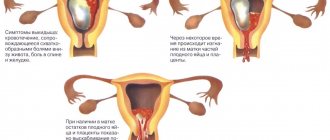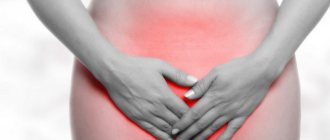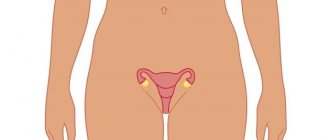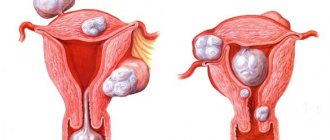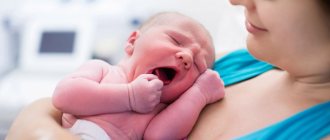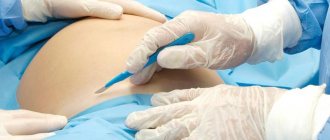Norms and terms of cycle recovery
The wound surface is cleansed and lochia appears. They come out during the process of returning the internal tissue of the uterus to normal. Normally this occurs within 30-45 days. After surgery, the time increases to 3-4 months due to scar formation and prolonged healing.
At least two weeks pass between the cessation of postpartum discharge and the start of the cycle. Hormonal levels are restored a month after birth if there is no lactation. Depending on natural or artificial feeding, the timing of the onset of menstruation is determined. In the second case, the process begins a month after birth. With mixed feeding, the cycle is restored after 4-6 months.
Milk is produced under the influence of prolactin. The pituitary gland suppresses the growth of eggs, the level of estrogen does not increase. Women note that they have not had periods for a year after giving birth when they feed by the hour. During this time, it is necessary to regularly use contraception. Switching to mixtures leads to the rapid onset of menstruation in the next two months. Ovulation occurs, so a new pregnancy may occur.
If there are no periods for more than a year after childbirth, the first time the discharge is heavy, with blood clots. If the pad is changed every hour, this is a reason to contact a gynecologist. Subsequent periods are normal. The recovery rate will be faster if the woman gets enough sleep and relatives help look after the child. The expectant mother eats right, there are no complications after childbirth and depression.
Caesarean section does not affect recovery time. Menstrual function may not be restored for a long time due to the presence of a suture and a long return to the normal state of the ovaries. Additional therapy will be needed after visiting a gynecologist. Menstruation is profuse. In the postpartum period, they lose three times more blood.
Restoring menstruation after childbirth
The presence of menstruation is one of the signs of a woman’s ability to conceive a baby. The discharge represents the exfoliated inner lining of the uterus, which was not useful in the current cycle, and an unfertilized egg is also released with it. If the egg has been fertilized, then it is fixed in the uterus and the zygote begins its development, accordingly, menstruation does not occur.
After the baby is born, the work of the endocrine glands returns to the state that occurred before pregnancy. From the moment the placenta leaves the uterine cavity, the process of healing the formed wound, contraction of the organ and its return to the lower abdomen, etc. begins.
During pregnancy, the uterus stretches and increases in size by about 100 times relative to its normal state, and after childbirth it gradually shrinks back
Immediately after giving birth, a woman begins to experience heavy bleeding - lochia, but this should not be confused with menstruation. Lochia is the result of cleansing the uterus of everything that remains in it after pregnancy and labor, including pieces of the baby’s membranes, blood after the placenta is torn off, and in some cases, particles of the placenta itself.
The endocrine system begins production of the hormone prolactin - it is necessary for the production of milk by the mammary glands and suppression of the ovulation process in the ovaries. The female body needs to feed its offspring, so the possibility of becoming pregnant again is temporarily blocked. The process of restoring the menstrual cycle is strictly individual and depends directly on the method of feeding the child, for this reason the timing may vary.
Artificial feeding
When artificially feeding with the help of adapted milk formulas, prolactin production in the female body is not maintained at a high level due to the lack of breastfeeding by the baby. Thus, the absence of menstruation is not associated with lactation, but is limited only by the timing of restoration of the uterus after childbirth.
With artificial feeding, the timing of the onset of menstruation does not depend on lactation and is limited to the period of restoration of the reproductive system
After the birth of a child, the process of involution of the uterus begins - it descends, contracts, takes on its previous shape and size, and the pharynx closes. At the location of the placenta during pregnancy, after its release, a wound surface remains, which requires time to heal. In general, it takes from 6 to 8 weeks to restore the organ and build up a new endometrium (internal lining) (this is the period for which women in labor are recommended to be in sexual rest mode). After restoration of the lining of the uterus, subject to artificial feeding, the process of ovulation begins, and menstruation begins. The norm is considered to be from 6 to 16 months.
Mixed feeding
If a child does not have enough mother's milk, he is given supplementary feeding - adapted milk formulas are added to the diet. In such a situation, the baby suckles at the breast, but in a much smaller volume than with completely natural feeding. Accordingly, prolactin production cannot be at a high level, and the cycle is restored within a period of 3 months. The norm is the absence of menstruation for up to 9–12 months, no more.
Breast-feeding
Natural feeding means that a woman constantly needs milk for her baby; accordingly, the body will maintain its production as long as the baby stimulates it with his sucking. Active production of the hormone prolactin blocks ovulation, and a condition called lactational amenorrhea occurs (absence of menstruation due to breastfeeding).
The duration of lactational amenorrhea can vary from 3 months to 2 years, and depends on a combination of conditions:
- frequency of breastfeeding. Feeding at the baby's request, and not according to a schedule, supports the production of prolactin and active milk production, accordingly, delays the restoration of the cycle;
- general health of the mother;
- availability of complementary foods in the baby's diet. After 6 months, even with completely natural feeding, the introduction of complementary foods begins - introducing the baby to adult food in small doses. The process is associated with a decrease in the baby's need for mother's milk, feedings become more rare, and the production of the hormone prolactin decreases, which makes it possible for ovulation and menstruation to begin.
When breastfeeding, the hormone prolactin is produced in large quantities, which blocks ovulation and menstruation may not occur throughout the entire period of feeding the baby.
Thus, the norm for the absence of menstruation while breastfeeding is from 3 to 24 months, and in the absence of disturbing symptoms, a woman should not worry if her cycle has not returned quickly.
After my first child, my first period came after 7 months, when I completely replaced one feeding. But they were not yet regular. After 2 months, when I completely replaced another feeding, the next ones came. But the regular ones haven’t really recovered. Because I breastfed until 10 months. And when the first one was 1 year 2 months old, I was already pregnant. With the second it was a little worse, but approximately according to the same pattern. True, he ate the breast worse, I alternated feeding, then fed again, but it started about the same, after about 6-7 months.
Lily
https://www.komarovskiy.net/forum/viewtopic.php?t=1433
Reasons for the absence of menstruation during lactation
Breastfeeding is a natural process that lasts on average about a year. Sometimes the period increases to two years. For many, their first period came a year after giving birth, as soon as lactation ended. When breastfeeding, it is important to avoid worries and stress. Problems in the family lead to a decrease in milk supply.
The absence of menstruation is associated with hormonal instability. When the cycle has not fully recovered, the duration changes every month. It goes away within 5-10 days. Menstruation does not come after childbirth for more than a year due to gynecological, chronic and acute diseases of the reproductive system, complications. This includes a new pregnancy if the woman did not use contraception.
There may be no periods from 1 to 18 months. During the year they feed only once due to unstable hormonal levels. The situation is considered normal when a year has passed after giving birth, but there are no periods. The cycle will be restored when the woman completely stops feeding the baby. There is a high likelihood of a quick recovery if there is no breastfeeding at night. Menstruation is scanty and lasts less than usual. If you breastfeed intensively for more than a year, your menstrual cycle will resume within 10 weeks after it stops.
When introducing complementary foods from 6 months, the first menstruation occurs at 8-9 months. They may go on, then stop, and then start again later. It does not matter how the woman gave birth, natural or by caesarean section.
Menstruation is absent due to emotional stress, exhaustion of the body, or while taking hormonal therapy. Among the reasons: irregular daily routine, lack of sleep, poor diet. With artificial feeding from birth, the cycle will be restored in a month and a half. Ovulation occurs, increasing the risk of a new pregnancy.
Combined feeding affects the restoration of the cycle in the third month after birth. Sometimes the period is 4-6 months. They differ from menstruation to feeding in the duration and strength of the discharge. The production of prolactin is reduced and its effect on the ovaries ceases.
general information
The resumption of menstrual periods after the birth of a baby is preceded by serious hormonal changes, which is why some young mothers do not have periods for a year after giving birth. Also, similar behavior of the body causes breastfeeding of a newborn.
Another reason for not having periods can be a new pregnancy, because very often women think that they cannot get pregnant while breastfeeding an older child and do not attach due importance to the use of contraception during sexual intercourse.
The absence of menstruation after childbirth can be caused by other factors:
- daily routine of a woman in labor;
- features of the diet of a young mother;
- duration and quality of a woman’s sleep and rest.
In order for menstruation after the birth of the baby to come on time and proceed without any special changes, a woman needs to eat properly and balanced, sleep at night and take daytime sleep breaks, there is no need to be nervous and all diseases, especially the genital area, should be treated in a timely manner.
New pregnancy
Despite the fact that the woman is breastfeeding, but menstrual bleeding has not come, a new pregnancy cannot be ruled out. Feeding on demand will help reduce the risk of its occurrence. Be sure to apply every night. Avoid pacifiers to prevent the baby from refusing to breastfeed.
Symptoms will help determine pregnancy:
- soreness of the mammary glands and nipples;
- absence of menstruation;
- heaviness in the lower abdomen;
- exacerbation of taste and olfactory qualities;
- mood changes frequently;
- nausea;
- drowsiness;
- change in the child's behavior.
If after six months the cycle has not occurred, a pregnancy test is taken. It will be positive 7-10 days after conception. There are several options for the development of events. They continue feeding and wean the baby from the breast, as the taste and consistency of the milk changes. In the second trimester, fluid production decreases, and complementary feeding formulas are selected.
The gynecologist advises using artificial feeding. During pregnancy, hormonal levels change. Increased levels of prolactin and oxytocin levels increase the risk of spontaneous miscarriage. It is better to plan a child in three years. The body will recover and prepare for the next pregnancy.
If pregnancy is during lactation, the nursing mother experiences psychological discomfort. Blood loss from previous births has an impact. There is a deficiency of vitamins and microelements necessary for the production of high-quality breast milk that meets the baby’s needs. Tooth decay and hair loss occur. A new pregnancy is an additional burden on the body.
When did your period start?
But even when they begin, a regular cycle will not be established immediately. After such a serious hormonal shock, the body needs time to recover. As a rule, this takes from 2-3 months to six months. During this period, a broken cycle is not a deviation. Menstruation may occur irregularly, and its duration and intensity may vary. This shouldn't be scary.
But this development of hormonal levels creates a lot of problems, in particular for planning the next pregnancy. To prevent your second baby from being an unpleasant surprise, it is necessary to develop a protection strategy. If complementary foods have been introduced for a long time, but you still don’t have your periods, or they have started, but are extremely irregular, then you should consult a doctor.
Their absence may have several reasons:
- Gynecological diseases (inflammation, cysts, etc.).
- Hormonal disorders.
- Psychogenic factors.
The examination will help the doctor determine the cause of the disorder and prescribe appropriate treatment. After all, every young mother wants to maintain strength and health for her already born child and those she has yet to give birth to. And for this you need to be attentive to yourself.
Complications
When bleeding after childbirth is pathological, there is no need to wait several cycles. Irregular periods a year after childbirth or a sudden cessation of discharge indicates a curvature of the uterus or the development of endometritis. The help of a gynecologist will be needed if the interval between menstruation is more than 3 months.
Scanty periods of more than three cycles are a symptom of a hormonal disorder, Sheehan syndrome. With ovarian pathology, the break between cycles is up to 2-4 months. Heavy bleeding indicates the presence of remnants of the fetal membrane in the uterus.
The duration of menstruation should not last more than 7-10 days. Problems will be indicated by weakness and dizziness. Pay attention to the amount of discharge a year after birth, change in color, pain and discomfort in the abdomen, the appearance of fever, and unpleasant odor. Symptoms begin with infection and tumor. With an inflammatory disease, spotting spots are noted before and after menstruation.
A diagnosis of candidiasis will be made if there is itching in the vagina and a discharge mixed with cheesy substances. The help of a gynecologist is needed when bleeding occurs twice a month for more than three cycles. Fatigue and feeling of weakness indicate anemia.
A symptom of childbirth complications is Sheehan syndrome. Occurs with severe bleeding. Blood pressure decreases and pituitary cells die. The main organ regulates the function of the reproductive system.
A gynecologist is contacted if the cycle does not improve within two months and feeding has stopped. The cause of irregularity for more than three months, pain, scanty or heavy menstruation, is established. Pay attention to pain in the uterus, bright red discharge, and the presence of large clots. Sanitary pads should not be changed more than once every two hours.
Blood volume matters. Normal yield is 50 to 150 ml. Pathology is considered to be a smaller or larger amount of discharge. The cycle duration changes. Premenstrual syndrome is noted, characterized by irritability and insomnia. The woman constantly wants to eat, feels dizzy, and has bouts of nausea. The appearance of premenstrual pain indicates the body’s unpreparedness for full recovery, inflammatory processes in the pelvis, and strong contractions of the uterus.
Features of postpartum menstruation
In pregnant women, menstruation is normally absent completely, but after the birth of the baby, critical days after a certain time become regular again. Let's consider what happens in a woman's body after childbirth:
- the regular cycle of menstruation begins almost immediately after the birth of the child, and the discharge itself does not differ from the regular periods that existed before pregnancy. Their character can change only if there are chronic inflammatory processes or endocrine diseases;
- Menstruation after childbirth may become painless. Almost 90% of women note this feature of postpartum menstruation at their first visit to the gynecologist. From a medical point of view, this is explained by the presence of a bend in the uterus before pregnancy, which complicates the normal discharge of secretions. After gestation, the uterus changes shape and position in such a way that the curve changes, and the onset of menstruation is no longer associated with pain;
- even if menstruation occurs 1-2 months after childbirth, this does not mean that the period of recovery of the female body has already completely ended and you can become pregnant again. There is no need to rush into a new conception, because it takes at least 2 years to replenish the reserves of minerals and vitamins that will be required to nourish the new fetus and for the normal functioning of all systems in a woman’s body. To prevent a new pregnancy, you need to use suitable contraception, which your doctor will help you choose.
Only feeding activity and the length of the lactation period have a greater influence on when periods should begin after childbirth. Some representatives of the fair sex are very mistaken when they think that this period depends on the method of childbirth; in fact, this is not the case. After a natural birth and after a cesarean section, the onset of menstruation will be determined by the way the baby is fed.
Usually, periods after childbirth will not differ much from those before conception, but there are situations in which you should consult a doctor immediately:
- if there is severe pain in the uterine area;
- if menstrual flow has a very strong specific odor;
- if the discharge is too intense and lasts more than a week;
- if there are no critical days 2 months after stopping breastfeeding;
- if the discharge has large clots and is bright scarlet in color, this may be a sign of a serious illness.
Treatment
Women note that a year after giving birth, they have scanty periods, but the cycle is irregular. Stress affects the functioning of vital systems. Good nutrition promotes rapid recovery. Combine physical activity with drinking regimen, eating fruits, vegetables, meat, and dairy products. The gynecologist will prescribe additional vitamins.
Diagnostics in the form of a gynecological examination will be required. They donate blood, smears, do ultrasound, CT scan of the pelvic organs. They visit specialists to identify anemia, thyroid diseases, and diabetes. Use non-hormonal contraception and condoms. They rest during the daytime. Establish a balanced diet. Eat vegetables, meat, protein, fruits. Avoid weight loss diets. They clearly plan the day and ensure proper sleep. Following the rules reduces the load on the nervous system.
Drug therapy is prescribed. Take traditional medicine with caution. They spend more time in the fresh air and go to nature. It is recommended to visit the pool and play sports. After a caesarean section you will need help from relatives. During abdominal surgery, you cannot lift heavy objects; movements are constrained.
A correct diagnosis can be made after excluding other factors affecting the restoration of the menstrual cycle. Chronic diseases of internal organs have a negative impact. First of all, correction is carried out, then they visit a gynecologist. For iron deficiency anemia, medications are taken after a blood test for hemoglobin levels. Visit an endocrinologist to rule out benign tumors.
Restoring normal menstrual function is the key to a woman’s future health. All problems with disorders are resolved with a gynecologist. The monthly cycle is a complex process responsible for conception. It will take time to return to the previous state. Following postpartum recommendations will help avoid complications and quickly normalize your periods.

